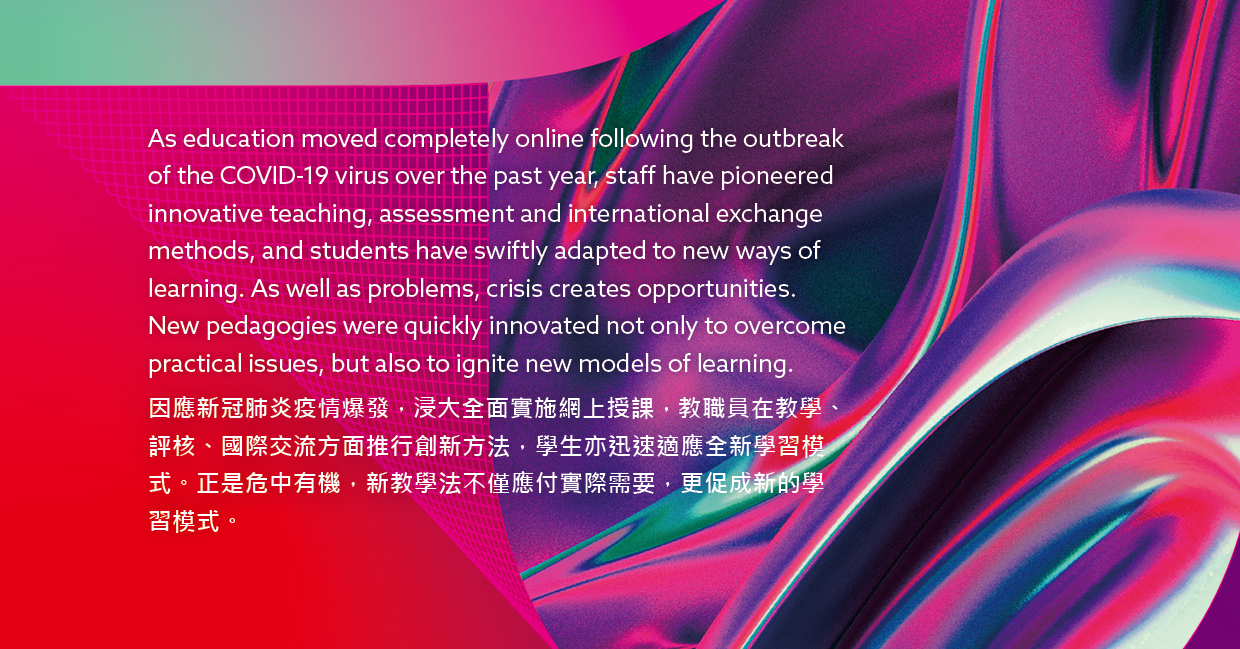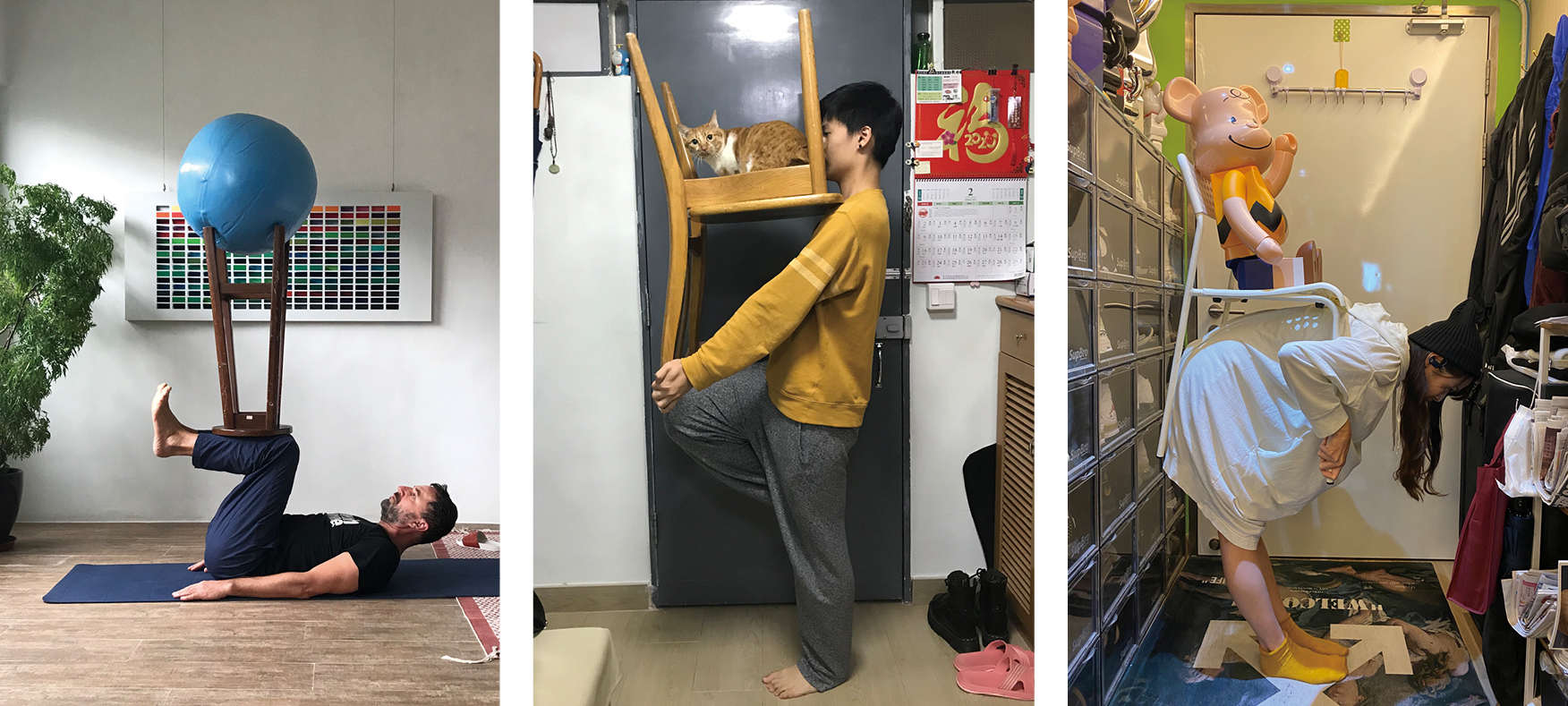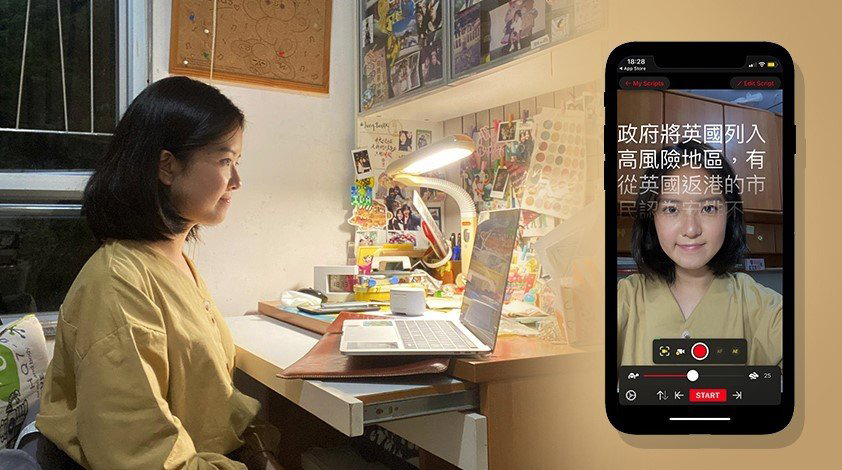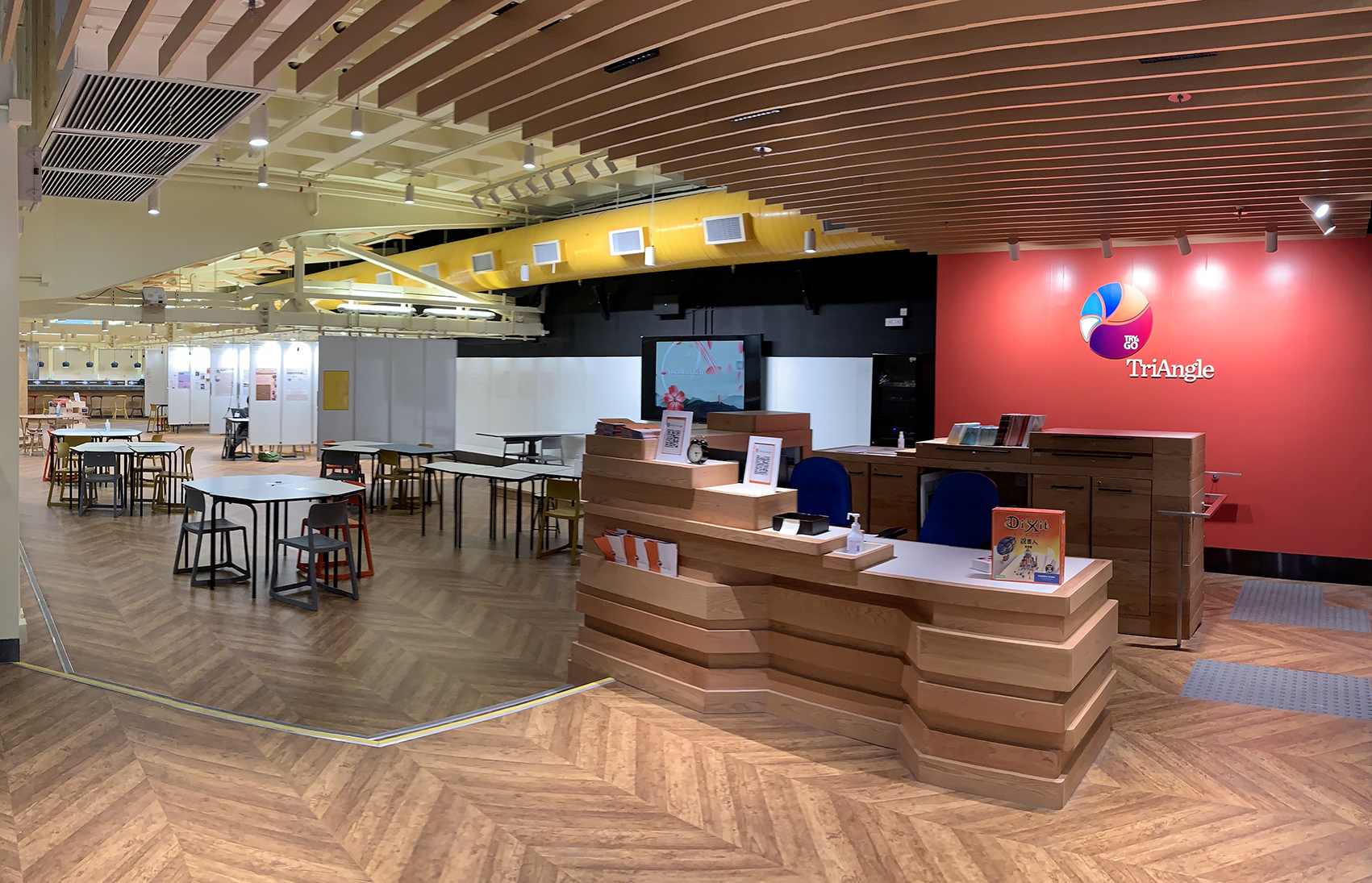University Review
New norm of teaching and Learning


Moving the class online
The social unrest and the outbreak of the COVID-19 virus prompted all teachers to come up with new modes of teaching and assessment following the suspension of face-to-face classes. Although staff at HKBU have long offered a blended learning approach, the complete shift of learning and assessment activities to online during the pandemic has indeed propelled the more effective use of e-tools or other means to enable students to receive high quality teaching from our educators.
While faculties and departments took different tailored approaches with respect to the demands and needs of their respective programmes, a few special examples stood out. The viral outbreak was a global crisis leading to huge issues around the world. Yet it has also driven breakthroughs in innovation and great changes in education.
School of Chinese Medicine
The suspension of classes and travel restrictions brought unique challenges for students at the School of Chinese Medicine, but staff came up with ingenious solutions that enabled learning to continue.
Although internships for the Bachelor of Chinese Medicine and Bachelor of Science (Hons) in Biomedical Science programmes were brought to an abrupt halt by the pandemic, an array of pre-recorded video lectures from the top internship instructors at the Guangdong Provincial Hospital of Traditional Chinese Medicine and the Foshan Hospital of Traditional Chinese Medicine were made available to students to refresh and enrich their clinical knowledge.
In addition, the School joined hands with The Chinese University of Hong Kong and The University of Hong Kong to run a series of joint university webinars for undergraduate students beginning in February 2020. The collaboration presented students from the three universities with a valuable opportunity to learn from a wider variety of medical specialists, and it also acted as an academic platform for cross-institutional exchange. The well-designed series covered Chinese medicine approaches to a wide range of medical conditions, ranging from COVID-19, cervicogenic headache and dizziness, and cancer to rheumatism, pulmonary disorders, infertility, eye conditions, and joint and bone diseases.
Academy of Visual Arts


Online learning posed unique challenges for students and staff of the Academy of Visual Arts (AVA), but clever initiatives were introduced to enable students to continue their learning in a supportive virtual environment.
For sculpture, Mr Ekkehard Altenburger inspired his students with a series of specially-designed creative online teaching modules that encouraged them to generate new ideas and use materials from their homes to create artworks.
For example, to teach the concepts of balance and positioning, which are fundamental elements in sculpture, Mr Altenburger instructed his students to produce sculptures using their own bodies, a chair and an object, with the condition that the chair could not be placed on the floor and they could not hold the object in their hands. Other tasks included asking students to produce a graphite rubbing of a place or object, and to create an artwork with captions of poems or phrases. These innovative pedagogies not only resulted in exceptional student attendance levels and highly creative student work, they also earned Mr Altenburger recognition in the 2020 e-Learning Excellence Awards.
School of Communication
With face-to-face classes suspended, teaching staff at the School of Communication helped students build up their resilience and to take their learning forward by a variety of innovative means. Professor Kara Chan, Associate Dean (Teaching and Learning) and acting chair of the e-learning subcommittee, organised the first university-wide training to full-time and part-time teaching colleagues on online teaching and learning pedagogy, as well as assessment strategies in January 2020. She also organised the first university-wide training session on mixed-mode teaching and learning in August 2020.
To strengthen the interaction between teachers and students in online classes, Dr Angela Mak from the Department of Communication Studies hosted an online media training exercise that allowed students to role-play in a simulated news programme. Through this approach they acquired practical media coaching skills in an interactive and vibrant manner. This training motivated the students to communicate with each other instead of just listening to a lecture, and also allowed them to stay connected with real-life business issues.


In another example from the Department of Journalism, staff from the Broadcast Journalism Stream quickly redesigned the news anchoring course to offer students novel ways to acquire hands-on experience in the absence of in-person practice at the broadcast studios on campus. Students were introduced to a range of mobile apps and devices that offer teleprompter and autocue services. They then practised news presenting and script reading at home, with weekly assignments that involved them in recording videos of themselves presenting the news. With this novel way of learning, they were able to acquire valuable experience of news presenting, as well as other presenting skills such as wrapping up and ad-libbing in real-time during broadcasts
In view of the difficult situation faced by graduating students, the School launched a one-off scheme, namely the Master's Experience 2020, to allow UGC-funded undergraduate students graduating in 2020 to sit in on up to five taught Master's courses offered by the School in the first semester of 2020-21. Under this scheme, students can make use of their enforced down-time to acquire more specialised skills and advanced knowledge in order to enhance their employability and readiness for further studies. The aim is that these students will thus be able to bounce back more quickly when conditions improve.
Innovative approaches to assessment
With the campus closed due to the virus, the mode of assessment moved online as the traditional approach of holding end-of-year exams or exhibitions in large halls became untenable. The question of how to assess work, which is normally examined in person, also took on increased importance, and innovative approaches were devised with the aid of an online video communication platform.
Presenting art via virtual reality
For the Academy of Visual Arts, the traditional focus on a large year-end show had to change as it become impossible to host such an event on campus during the pandemic. Instead, for programmes such as the Master of Arts in Visual Arts, the corresponding graduation exhibition was presented to the public via virtual reality. Staff from the Academy have also built a virtual gallery to house the virtual sculptures, videos and audio works produced by students with the aid of modelling software that they learnt about in class.
Practical examination goes online
While most examinations can be conducted online, assessment of the practical session was only made possible with the aid of a video communication platform such as Zoom. For example, in the assessment of news anchoring, students were shown the assessment content and then they needed to absorb the information quickly before conveying it smoothly and accurately to the camera, just as they would during a live newscast. Likewise at the School of Chinese Medicine, postgraduate students taking the course Examination and Diagnosis of Musculoskeletal Disorders performed their online practical demonstrations via Zoom.
Collaborative approach to assessment
In addition to individual approaches within certain programmes, the University is working with the Education University of Hong Kong on a project to try out authentic assessment methods. The changes over the past year also provide an opportune moment for universities to consider a paradigm shift for assessment and to assess the learning progress rather than just the learning outcomes.
International exchange
The social unrest and COVID-19 pandemic posed immense challenges to the University’s international exchange programmes. However, even during this most complex year, brilliant new ways were devised for students to carry out exchange activities with other universities. The University has also continued to forge new relationships with some of the leading universities around the globe.
Supporting students on exchange
As early as June 2019, incoming exchange students started to withdraw from study in Hong Kong due to the social unrest and partnership universities suspended their Hong Kong programmes. This situation continued throughout the academic year with the emergence of the virus and later with the cancellation of exchange programmes in the second semester.
The situation was dealt with swiftly and effectively. Contingency plans, emergency support and flexible arrangements were introduced during the social unrest, and communication sessions were held to support and reassure incoming exchange students. Such timely responses of the University demonstrated its excellent communication with students and partner universities, and drew widespread praise from international universities and students.
Go virtual: new mode of international exchange
As teaching and learning moved online due to the pandemic, international exchange activities also shifted from the physical world into the digital space. While capitalising on this unprecedented opportunity to explore new ideas and creative approaches to cross-boundary teaching and learning, the University recognised that virtual exchange is different from, and cannot replace, physical exchange.
Partial virtual exchange was introduced in a pilot run in the first semester of the 2020-21 academic year, paving the way for the full implementation of online-merge-offline exchange later. In this hybrid approach, HKBU and participating partner universities offer a number of courses online in mixed-mode, with students present physically and online synchronously. Exchange students also enrol in online courses at the host universities and take classes together with local students. To complement virtual exchange, an educational trip to the host country or countries of partner universities during semester breaks is added. In addition, academic units and faculties explore new virtual collaborative initiatives via co-teaching and guest lecturing.
Virtual Hack and Design Challenge 2020
The Virtual Hack and Design Challenge 2020 held in April 2020 provided an excellent example of how international exchange can take place virtually during the coronavirus era. More than 110 university students from 16 countries and regions gathered online over a 48-hour period to develop innovative projects that address the COVID-19 crisis. The enthusiastic response to this initiative showed that effective remote collaboration and the exchange of ideas is achievable in a virtual setting. In particular, the competition offered participants a unique opportunity to collaborate across different time zones and share global wisdom and impactful insights.
Partnerships with top global universities
As part of the University's internationalisation strategy, 45 partnership agreements in 21 countries and regions were signed over the past year. Those involved included top universities such as the University of Oxford, the University of Cambridge, Imperial College London, and Yale University, as well as the University of Bologna, the oldest university in the world. These collaborations contribute significantly to HKBU's globalisation efforts and promote the international standing and reputation of the University.
Our schools and departments also continue to forge new relationships and create exciting courses with international universities. In particular, the School of Business has collaborated with Kozminski University in Poland to launch a double degree programme for Bachelor of Business Administration students. The School of Business and the Faculty of Science each has a double degree arrangement with Simon Fraser University of Canada. Students of the School of Communication may also pursue double degrees with the University of Queensland in Australia and University of Missouri in the USA. The double degrees allow students to receive world-class education from both institutions, and to widen their international experience and exposure.
Besides, the Department of Government and International Studies has developed two combined degrees with the Institutes of Political Studies (or Sciences Po) in Bordeaux and Lyon. HKBU graduates of these combined degree programmes can gain at least two degrees: a BSocSc (Hons) in European Studies at the end of the fourth year from HKBU and a Diplôme de Sciences Po (equivalent to a Master's degree) either in Bordeaux or Lyon. For the 2020-21 academic year, four students from Sciences Po Bordeaux have joined the combined degree programme.
Shared Campus
Launched in Switzerland in December 2019, the Shared Campus project aims to become the leading international cross-institutional platform for integrated transcultural creative practice education and research. In its scope and long-term approach, the project is internationally unique in the area of tertiary art schools including our Academy of Visual Arts and will become a defining model for the tertiary landscape of the future by interlinking HKBU with selected international arts institutions – all leading institutions in their respective regional context – in a dedicated, committed and intensive collaborative arrangement.
While the COVID-19 crisis led to the halt in several activities following the project's launch, two international summer schools (Hacking Global Pop Icons and Ghost in the Walls) were held online as scheduled in June and July 2020. In addition, the pandemic has shown the importance of projects such as Shared Campus within the current global education landscape, and it has also underlined the apparent demand for enhanced online and remote teaching and learning tools specific to visual arts and culture.
Innovative Service Learning
Our connections with the community are a vital part of HKBU’s operation, and service-learning forms a core part of our education and commitment to providing the best student experience. Although the events of the past year posed an immense challenge to service-learning courses, our students still managed to deliver 30 service-learning projects as part of their formal curriculum, through which they gained a novel and memorable experience in applying their knowledge and skills to address community needs during a most difficult time.
Despite the challenges, many service-learning courses moved online and some notable programmes were held. One example was the GO! Ginger Onion project for DSE students. As part of this course, Dr Vivienne Leung of the Department of Communication Studies encouraged her students to work in groups during COVID-19 with Go!Ginger Onion, an online social network platform that empowers Hong Kong youths to explore opportunities in life. The students created a variety of innovative campaigns, ranging from games and online challenges to "add oil" cards and videos. These campaigns engaged, encouraged and cheered up DSE students facing an unprecedented situation.
Blending service-learning and research
During the past year, the Centre for Innovative Service Learning (CISL) has come up with a new initiative that connects service-learning with the research interests of the instructors. One notable example is the course designed by Dr Daphne Mah of the Department of Geography.
Dr Mah incorporated service-learning in her course on Energy Policy and Analysis, in which students drew on their experiences in Hong Kong to design an advocacy campaign for policy-makers of schools in Guangdong province that encouraged them to install solar panels. Although the planned trip to Guangdong was cancelled, the primary school students there benefitted from our students' online videos that were tailor-made for them.
Exciting new spaces


While CISL has worked hard to organise programmes and courses in the community, the past year also saw significant developments taking place on campus. In January 2020 a new co-working space, named the TriAngle, opened on the Li Promenade. Intended as a creative space for students to incubate and materialise ideas and scale up their service-learning projects, the TriAngle also functions as an event space. Throughout a disrupted year it still managed to host an impressive 21 events with over 1,000 participants, including the "The Age of Robots" exhibition and a masterclass with the artist Yves Gellie.